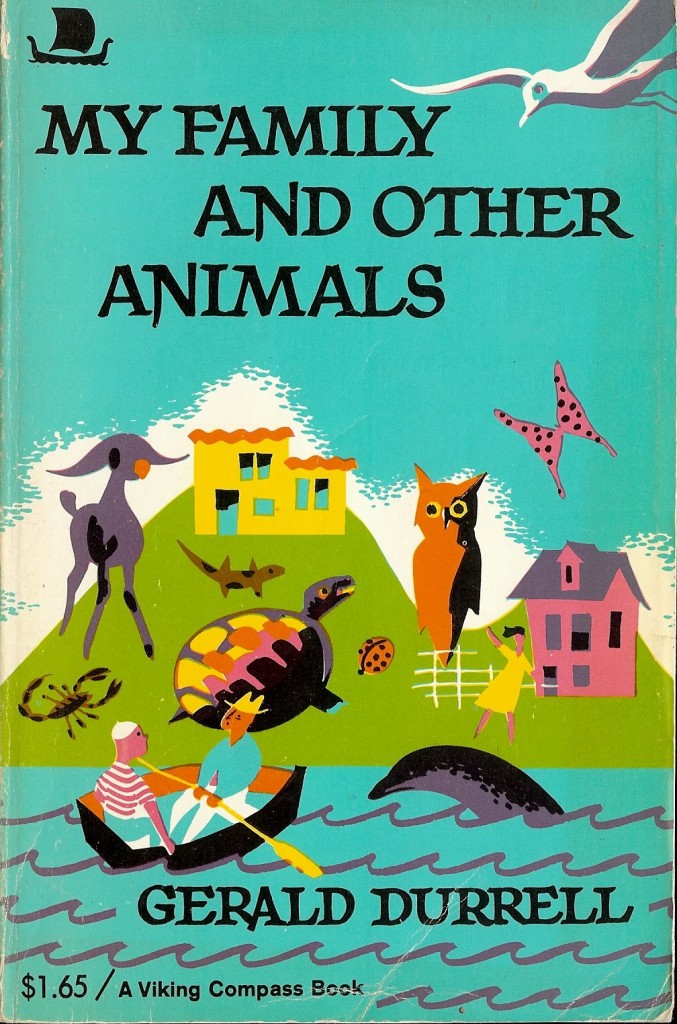Daily Mammal Book Club: MFAOA 2
Hi again, mammals! The discussion about My Family and Other Animals by Gerald Durrell is going great so far. We’ve probably all read a little further into the book by now, but remember, even if you haven’t read any of it at all, you can still participate in the club meetings. Here are some things I thought about over the past week:
• In a comment on last week’s post, Grace said that she gets impatient with the description in the book, and Clare said that her mother feels the same way. (Grace is my mother, by the way!) Some of the Amazon reviewers said the same thing: they skip the descriptive passages to get to the stories about the family. I often skip long descriptions in books, too, but for some reason, in this book, I don’t do that. I think I’m getting into the pace of it. Plus, Durrell’s descriptions are just so good! If I were teaching creative writing, I think I would use this book as an example of how to write good description.
• The poor mother! I just love the transition from Part 1 to Part 2. Part 1 ends:
“We are not moving to another villa,” said Mother firmly; “I’ve made up my mind about that.”
She straightened her spectacles, gave Larry a defiant glare, and strutted off towards the kitchen, registering determination in every inch.
And then Part 2 begins:
The new villa was enormous…
I suppose it’s a fairly easy comic trick to pull, but it cracked me up nevertheless.
• Man, I want to live in the daffodil-yellow villa. The faded walls, the overgrown gardens, the olive groves and orange trees, the bees, the view of the sea…I just love it. It’s exactly my vision of how a villa in a Mediterranean country should be.
• I was thinking about how charmingly Durrell anthropomorphizes animals. When Madame Cyclops lays her eggs: “She turned round, lowered her hind end over the hole, and sat there with a rapt look on her face while she absentmindedly laid nine white eggs.” The scorpions in the wall: “The scorpion would lie there quite quietly as you examined him, only raising his tail in an almost apologetic gesture of warning if you breathed too hard on him.” One of the male birds: “The other male now became terribly harassed and apparently a prey to the dreadful thought that his babies might starve.” And Roger after the scorpions escaped at lunch: “Since no one had bothered to explain things to him, Roger was under the mistaken impression that the family were being attacked, and that it was his duty to defend them.”
Ordinarily, I’m not a big proponent of anthropomorphization. (Jeez, that’s a difficult word to type.) But I love the way Durrell does it. In a pretty straightforward way, it helps to create a clear picture of an animal, making it sympathetic and a subject of interest. I think that in order to care for and respect animals, we have to understand that they do have their own thoughts and lives. I don’t know if a turtle can be absentminded, a scorpion apologetic, or a bird harassed and a prey to dreadful thoughts, but being able to relate to them on an emotional level is, I think, ultimately good for both the animals and us. In this case, the accuracy of the thoughts and emotions we ascribe to the animals isn’t as important as the fact that we’re taking the time to imagine those thoughts and emotions. What do you think?


NOTE: In porting my old blog to its new site, for some reason, this post didn’t come through and I had to copy it by hand. So I’m going to copy all of the comments into this one here. Sorry ’bout that.
6 comments:
Leah said…
You made some good points about Gerry’s descriptions of the various animals and their behavior. I also see it as the perspective of a child where the child reflects his own emotions and explanations for events and feelings in describing the animals’ behaviors. One of the things I like most about Gerry’s writing is his ability to recapture the child’s perspective without it seeming awkward or contrived.
March 24, 2009 8:23 PM
grace said…
That is true. I think he does a very good job of writing from a child’s viewpoint. I remember ascribing feelings to almost everything as a child. I so envy Gerry his idyllic life and all the freedom he has. And I wish I had a Spiro in my life. The dynamics of Gerry’s family are very interesting. Larry seems to get his way most of the time. The poor mother, indeed!
March 24, 2009 9:25 PM
Jennifer Rae Atkins said…
I completely agree with both of you about how well he writes from the perspective of a child. The book was written, I think, almost 20 years after they left Corfu. It really says something about him as a man and as a writer that he could stay so connected to what it’s like to be a kid for so long, or at least what it’s like to remember being a kid…if that makes any sense.
I wonder, now that we know that in reality, Larry’s wife was in Corfu and they didn’t live with the rest of the family, how the dynamics “really” went down. It doesn’t really matter in respect to the story, but it’s interesting to think about how memoirs work.
Also, my dad points out that I meant anthropomorphism. No wonder anthropomorphization was so hard to type.
March 24, 2009 11:31 PM
Ted Slampyak said…
When I was a kid we had a lot of trees in our back yard. Looking at the yard now, as an adult, it’s just an average sized yard with a handful of trees, but when I was a little boy it was the great big woods and I was Grizzly Adams. I’d wander around back there for hours in the summer and after school, watching the bugs and getting the squirrels to run up onto my shoulder for a peanut.
Gerry’s recollections of his time alone in the gardens or along the countryside remind me of the timelessness of those moments, forever etched in my mind.
March 24, 2009 11:35 PM
Ted Slampyak said…
I haven’t been reading this book very much lately — sorry! I’ll do better!
But I just got up to meeting Theodore, the scientist-fellow who befriends the writer and sends him a very special gift.
I like Theodore! He’s got Asperger’s Syndrome like me!
“We stood in silence for a moment. Theodore was afflicted with the acute embarrassment that always seemed to overwhelm him when greeting or saying good-bye to someone. He stared hard at his boots for a moment longer, and then he held out his hand and shook mine gravely.”
Poor little Aspie!
I won’t give away the ending of Chapter 6 for those of you still catching up like me, but it was a very sweet moment! Yes, I like Theodore. I think every little kid should have a mentor like Theodore in their lives at one time or another.
March 27, 2009 9:48 AM
Clare said…
Ted — I am always really touched at the way Theo seems to open up to Gerry because of their shared interest.
I think that the support and friendship of an expert must have meant a lot a young naturalist. I love the descriptions of the teas they have together.
March 29, 2009 5:36 AM